PARLIAMENT | The cabinet will make a final decision on whether to allow refugees to work in Malaysia by next month, Human Resources Minister M Kulasegaran told the Dewan Rakyat.
"I believe a decision will be made between Dec 10 and Dec15, after a committee to discuss the matter has been set up and it will be announced to all Malaysians," he was quoted as saying by The Star today.
There will be some easing in regulations, Kulasegaran said when winding up the Supply Bill 2020 for his ministry at the committee stage in Parliament yesterday.
He was responding to Ahmad Tarmizi Sulaiman (PAS-Sik), who asked about the government's stand in allowing refugees to work in the country, given that they were already here.
The minister said it was his personal opinion that refugees should be allowed to work in the country.
"We all know that they are here, so why must we go overseas to hire foreign workers?
"That is why we had several discussions with various ministries, and a decision will be made soon.
"But as for registering them, the United Nations refugee agency, the United Nations High Commissioner for Refugees (UNHCR), is already issuing cards to them.
"When they go to work, they sometimes get detained by the authorities. This will cause a lot of problems for them.
"If they are allowed to work, in my personal view, we have labour laws.
"We know they are working here, but our labour laws cannot protect them.
"It does not cover their human rights, like providing minimum wage, although we have labour laws to protect Malaysians," Kulasegaran said.

As of October this year, some 177,800 refugees and asylum-seekers in Malaysia have been registered with the UNHCR, according to its website.
Some 153,200 are from Myanmar, with 98,130 of them being Rohingyas.
Some 68 percent of the refugees and asylum-seekers are men, while 32 percent are women. Children comprise one-fourth of the total refugees.
UNHCR had urged the Pakatan Harapan government to allow the refugees to stay and work in Malaysia.
While the refugees are recognised by the UNHCR, Malaysia is not a signatory to the 1951 UN Refugee Convention, which means all refugees are viewed as illegal migrants awaiting resettlement in a third country.
The country also does not extend protection, job opportunities or education to them, leaving many refugees to end up finding odd jobs in the informal sectors as cleaners, waiters or construction workers.
In its GE14 manifesto, Harapan pledged to ratify the 1951 International Convention on Refugees so that refugees who escape from war-torn countries and arrive in Malaysia are given proper assistance.

